Table of contents
Deoxyribonucleic acid, or DNA as it is commonly called, is responsible for the genetic makeup of every person. DNA sequencing can help people discover their immediate blood relations, such as parents, children, and grandparents. It can also trace ancestry and ethnic groups through several generations. This area of DNA testing, commonly termed ethnicity testing has allowed millions of customers to learn new information on their ethnic origins.
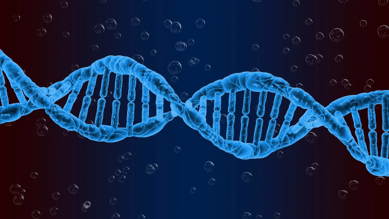
This article will be providing a comprehensive guide on every important detail concerning ethnicity testing.
What is an Ethnicity Test?
An ethnicity test, or a genetic ancestry test, is a test performed to link an individual or family to a particular ancestry or ethnicity by comparing their DNA to sequences in a particular DNA database for a match. The DNA in these databases are of known origins so that your “unknown” sample can be compared. The extent to which your DNA matches the known sequences in various regions determines how much of that ethnic background you have.
Ethnicity tests are some of the most performed tests and are the most advanced tests that allow individuals to gain insights into their genetic background, understand their family tree through common ancestors, and in some cases, learn their predisposition to certain underlying conditions.

Apart from the personal benefits of ethnicity testing, the results can be used to better understand migration patterns and family history.
Most test laboratories that perform genetic genealogy or ethnicity tests claim to have extremely vast DNA databases that span back as many as 500 years. This richness in historical DNA variations makes it easier for people to find links with ancestry and ethnicity with similar variation patterns. Plus, the more customers who contribute their DNA to a particular company, the more vast the company’s genetic data will be.
Types of Ethnicity Testing
While there are different types of testing for ethnicity questions, three methods stand out as the most commonly used in different genetic laboratories. Some companies perform all three tests since each one measures a person’s ethnicity from unique angles.
The three types of ethnicity testing available are Y chromosome (male line), mtDNA (female line), and autosomal testing.
Y chromosome testing (paternal Line)
This test determines an individual’s ethnicity from the parental line. Variations in the Y chromosome that are passed from a father to his male offspring are the major links used for exploring ancestry from the male line. While Y DNA testing is only possible for males, females may get some information if a close male family member takes the test.
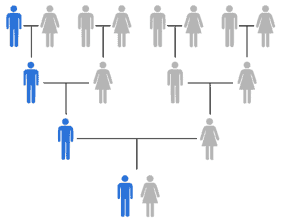
Y chromosome testing is one of the most helpful and popular tests due to its relationship with male surnames. Since the test can only be done by male offspring and male names are usually passed on in the same culture, individuals who bear the same name can perform the test to know if they are related.
Y DNA tests connect you to haplogroups which help determine where your ancestors migrated.
Mitochondrial DNA testing (maternal line)
Mitochondrial (mtDNA) testing is testing performed that is based on the maternal line. This test identifies genetic variations in mitochondrial DNA. Unlike the Y-chromosome test, both males and females can perform this test as both genders have mitochondrial DNA. This DNA is passed from the mother to the offspring, and therefore its test provides information about the direct female ancestral line and ethnicity.
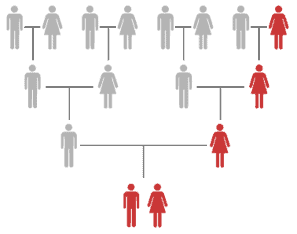
Mitochondrial DNA testing is one of the most important ethnicity tests performed by individuals tracing their ancestral line because it provides information on the maternal ancestral records that could have been lost due to female ancestors taking their male spouses’ surname.
mtDNA tests connect you to haplogroups which help determine where your ancestors migrated.
Autosomal DNA testing
Autosomal DNA tests analyze every other chromosome besides the sex chromosomes. They contain about 20,000 other genes. The results are compared with those of others who have taken the tests to provide an estimate of a person’s ethnic background. For example, autosomal DNA tests may show that an individual ancestry is approximately 50 percent European, 20 percent African, 25 percent Asian, and the remaining 5 percent attributed to an unidentified ancestry. These results are normally presented as a pie chart.
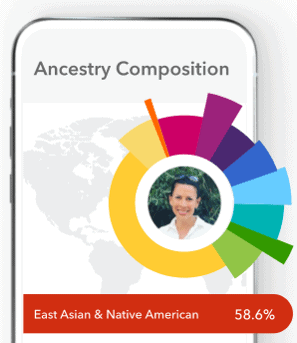
These tests are a more detailed choice than the Y chromosome and mitochondrial DNA test, as the results of the latter two only provide the ancestral history of a single parent and do not capture the entire ethnic background of the person carrying the test.Differences in autosomal single nucleotide polymorphisms (SNPs) are the main mechanism used to distinguish ethnicity relationships. Compared to other genetic variants, SNPs occur more frequently in human DNA. In fact, SNPs are found on an average of one out of every 300 nucleotides making approximately 10 million SNPs in a person’s genome.
Ethnicity DNA Test Kits
There are many commercial ethnicity tests that individuals can order. Most of these tests can be purchased and taken at home.
Purpose: The purpose of at-home ethnicity test kits is to give individuals interested in discovering their ethnicity and family tree the opportunity to perform the test themselves right from their home.
Availability: Most genetic genealogy testing offers at-home ethnicity test kits services that can be purchased online or in stores.
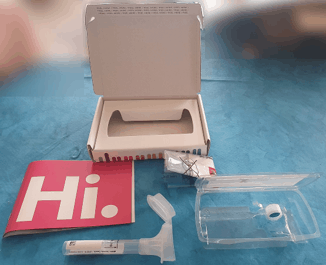
How it works: You can order a testing kit online from a reputable test provider. Once received, you can activate the DNA kit online to access your result when it is ready. Next, you will follow the instructions for DNA sample collection, which usually involves producing a saliva sample in a collection tube. Then, you send it back to the test company. Typically, after six to eight weeks, you will receive an email notifying you that your result is available online and can be accessed.
Costs: The cost of an at-home ethnicity test varies among test providers, but they are generally affordable with prices usually ranging from $95 to $200. Cheaper DNA tests tend to be accurate, but less comprehensive than more expensive tests.
Accuracy of Ethnicity Tests
While DNA tests for identifying close relations have been almost 100% accurate, establishing such claims for finding a person’s ethnicity is not always straightforward. For one thing, most laboratories that perform ethnicity testing have their own DNA databases and compare individual test results to those of previous tests. What this means is that ethnicity estimates may end up being different across different test providers.
Ethnicities are determined by looking at specific genes in a client’s DNA against those most commonly associated with certain global populations in the reference population. The moment the DNA reference database of a genetic test provider differs significantly, the ethnicity estimates will vary. Therefore, DNA testing companies with a large database range will give the most accurate results on a person’s ethnicity.
The degree of accuracy also depends on the ethnicity being tested. It has been established that results of ethnicity tests are more accurate when exploring Anglo-Saxon and European ancestry as there is more data from people of these ethnicities in the respective databases to compare to.
Also, another little limitation with ethnicity test, is the fact that while it may show an individual has an ancestral tree from specific regions (southeast Asia or Western Europe), pinning the roots to a specific country is not yet possible due to the fact that most test providers’ databases do not have enough information to distinguish genes such that some variant can be tagged to a precise country.
Despite these current challenges with ethnicity tests, it is expected that accuracy and reliability will eventually reach 99.99%. The more people take the test, the more accurate ethnicity estimates become.
FAQS
Are at-home ethnicity test kits as reliable as lab tests?
The results of home test kits are generally accurate and reliable as long as you purchased your test kits from a reputable genetic genealogy test firm.
Are there significant differences between the ethnicity testing methods?
Yes, there are. The Y chromosome test explores paternal ancestry, while the mitochondrial DNA Testing explores the maternal ancestry line. The autosomal test gives a more detailed analysis of an individual ethnicity.
Nebula Genomics
As already stated, an ethnicity test’s success and accuracy depend on the vastness of the test providing the company DNA database. This means that larger companies with multiple years of collecting references will be able to provide the most information with regards to ethnicity.
Nebula Genomics helps you find family connections and explore your ethnicity by sequencing 100% of your genome with our 30X Whole Genome Sequencing for $299 or less. In partnership with FamilyTreeDNA you can use our service to explore deep ancestry, including Y chromosome and mtDNA lineages through one of the largest DNA databases in the world. You can also upload raw data from other companies and download your whole genome sequencing from Nebula Genomics.
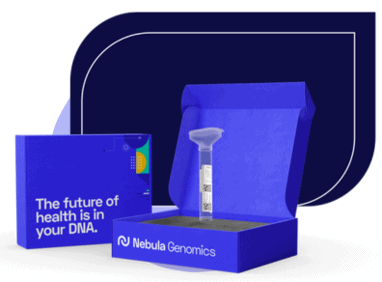
In addition to ethnicity, Nebula Genomics uses the most comprehensive genetic sequencing to offer health insights. Weekly updated reports keep you up to date with the most recent genetic research and allow you to compare your sequence to these recent discoveries.
Start exploring your DNA and gaining insights into your ethnicity today!
Do you have questions about specific ethnicities? You may be interested in our articles that focus on African American (like African Ancestry) and Native American DNA subsets!
